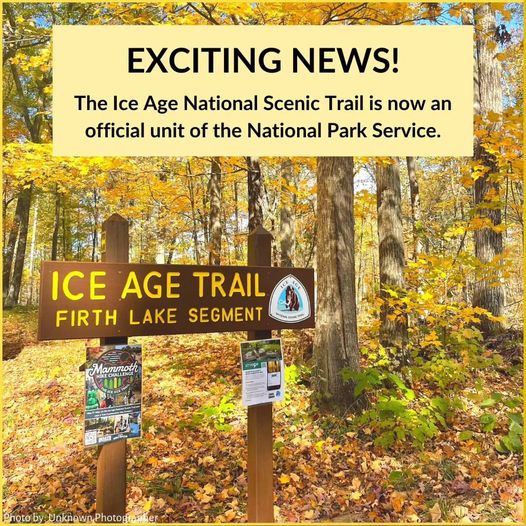
Editor’s note: The following press release was provided by the Ice Age Trail Alliance.
The Ice Age National Scenic Trail is now an official unit of the National Park Service.
Unit status gives the Ice Age National Scenic Trail:
- Official recognition within the National Park Service
- Access to additional funding opportunities
- Equal legal standing with other National Park Service destinations
The administrative change in status was announced during a video press conference on December 7 by National
Park Service Director, Chuck Sams and U.S. Senator, Tammy Baldwin (D-Wis.).
“This is truly momentous for the Ice Age Trail and its thousands of supporters and volunteers,” says Luke Kloberdanz. “Unit status gives the Trail, and its volunteers, the recognition it duly deserves,” he says. “Make no mistake: the Ice Age Trail is world-class and the number of hours Alliance volunteers devote to it consistently rank among the top in all the National Park Service.”
During fiscal year 2023, Ice Age Trail Alliance volunteers dedicated 100,666 hours to Trail-related activities including trailbuilding, maintenance, and outreach.
“Plus, the Trail gets more popular every year. Go out to a segment on a weekend; you’ll see for yourself—people are hiking the Trail like never before.”
An economic impact study completed in late 2019 found that 2.3 million people visited the Ice Age Trail annually; that number has increased since. A new economic impact study is currently underway.
43 Years to Unit Status
Designated as a National Scenic Trail in 1980 by President Jimmy Carter, the Ice Age Trail is 1 of 11 National Scenic Trails in the country; six of which are administered by the National Park Service. Of those six, three trails (Appalachian Trail, Natchez Trace Trail, and Potomac Heritage Trail) were identified as units at the time of their designation. This specification was missing from the wording of the law when the Ice Age Trail, North Country Trail, and New England Trail were designated.
There is no clear reason or policy for the discrepancy in language. However, non-designation had real-world implications for the Trails, including funding opportunity restrictions. It also meant the Trails were not recognized as part of the National Park Service.
“It was quite confusing. On one hand, NPS (the National Park Service) is our administrative partner helping to create the Ice Age Trail. Alliance volunteers go through NPS-required training and report their volunteer hours to NPS,” says Kloberdanz. “But on the other hand, the Ice Age Trail was not allowed to enjoy the same benefits as other units of the Park Service.”
“At last, the Ice Age Trail, North Country Trail, and New England Trail are on equal footing with other National Scenic Trails and National Parks,” he says.
Achieving unit status was a decades-long initiative for the three Trails. The leadership, volunteers, and supporters of the North Country Trail Association, Ice Age Trail Alliance, Appalachian Mountain Club, and Connecticut Forest and Park Association championed the cause.
“The Alliance appreciates the support of its elected officials at the state and federal level. We especially thank Senator Tammy Baldwin for being a stalwart supporter of the Trail since her days in local government and for spearheading the status change at the federal level,” Kloberdanz says. “Thanks also to Director Sams for his efforts and prioritizing the change. We look forward to a continued close relationship with our local NPS partners.”
Editor’s note: The six units that are now designated as NPS National Scenic Trails are:
Appalachian National Scenic Trail, Maine to Georgia (14 states)
Ice Age National Scenic Trail, Wisconsin
Natchez Trace National Scenic Trail, Alabama, Mississippi, and Tennessee
New England National Scenic Trail, Massachusetts to Connecticut
North Country National Scenic Trail, Vermont to North Dakota (8 states)
Potomac Heritage National Scenic Trail, District of Columbia, Pennsylvania, and Virginia




















